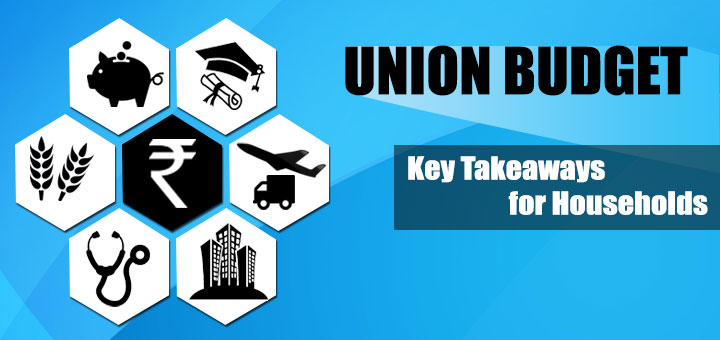How households can draw lessons from the Budget
The Union Budget can be a handful for most experts, leave alone households. So how can households hope to derive any lesson from the Union Budget? You will be surprised. All budgets are the same At a level all budgets, be it for a household or a nation, follow enduring principles and guidelines. Once you understand how the… Read More »

The Union Budget can be a handful for most experts, leave alone households. So how can households hope to derive any lesson from the Union Budget?
You will be surprised.
All budgets are the same
At a level all budgets, be it for a household or a nation, follow enduring principles and guidelines. Once you understand how the nation plans its budget, you will find the relation with your own budget only too obvious.
Let’s see what the Union Budget is all about.
The Ministry of Finance draws up a budget every year to project the expenditures over a given period.
The Finance Minister makes a comprehensive list of revenue and expense items and aims at matching the two so that country can live within its means, so to speak.
Typically, a nation’s revenues look like this:
- direct taxes like personal income tax, corporate tax
- indirect taxes like service tax
- non-tax revenues like dividends on investments and fees for services rendered
And its expenditure comprises investments in sectors like:
- Defence
- Education
- Social programs
- Agriculture
- Railways
Household budgets follow a similar pattern
Notice how the Union Budget relates to household budgets.
The family breadwinner earns income from sources including:
- Salary or business income
- Dividend income from investments in shares/mutual funds
- Income from other sources like rent on property or freelancing
Family expenses usually revolve around:
- food and clothing
- utilities
- rent or maintenance
- conveyance
- children’s education
- family outings
- Like the Union Budget, the challenge for the breadwinner is to stay on budget all the time so that total expenditure is met from total income.
The problem with most budgets
The purpose of a budget is to match revenue with income.Technically it is called balancing the two items.
- When the two match –it is called a balanced budget. This is not very common.
- When expenditure exceeds revenue, we have a deficit. This is fairly common.
- When revenue exceeds expenditure we have a surplus.
The problem with most budgets is that expenditure exceeds revenue resulting in a deficit.
The nation can meet its deficit from loans and because it has steady income streams, most institutions would be quite willing to extend loans.
How does a household bridge its deficit?
Most households struggle to meet expenditure from revenue. Consequently they are forced to look outside to bridge the deficit. Usually shortfall is met by resorting to loans from banks or friends.
Is a deficit bad news for a budget?
So long as the deficit is manageable and reduces over time it is acceptable. But if the deficit increases year on year it is bad news as it eventually leads to a default on loans.
This is true for households as also nations.
For households a bloating deficit is even more worrisome. It reflects poorly on the individual’s finances, and more often than not, there is a default in loan repayments or credit card dues. Credit rating agencies like CIBIL, downgrade the rating of the individual.This usually means that either he is not eligible for further loans or will get loans only at very high interest rates.
What are the takeaways from the Union Budget?
Individuals can learn much from the budget making and execution process of nations:
- The most important character of any budget is discipline and commitment to abide by the thumb rule revenues > expenditure
- Do not take a deficit in the household budget as acceptable, deficits can very easily transform into an upward spiral. Governments usually announce a deficit number (as a percentage of GDP) and stress their commitment by sticking to the deficit number so as to give outsiders confidence in the government’s finances.
- Unless it’s for a very urgent and unavoidable reason like buying a house, loans should not feature in the household budget. Borrowing is a bad habit and quite addictive too.
- If household expenses exceed income on a regular basis aim at knocking out some of the non-essential expenses. This is what governments do to reduce expenditure by scaling down workforce or entire departments, if necessary.
Source: Bajaj Allianz


